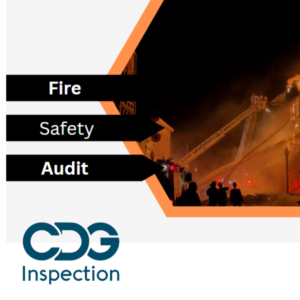Introduction
Fire safety is a paramount concern in every city, and Agra is no exception. Conducting regular fire safety audits is crucial to ensure the safety of lives and the preservation of the city’s iconic structures. This blog post explores the importance of fire safety audits in Agra, highlighting their role in preventing fire incidents, safeguarding historical landmarks, and fostering a secure environment for residents and tourists.
2. The Significance of Fire Safety Audits

Fire safety audits involve comprehensive evaluations conducted by experts to assess the effectiveness of fire prevention and protection measures in a specific location. Let’s delve into why fire safety audits are essential in Agra:
2.1. Protecting Historical Monuments
Agra is renowned for its rich cultural heritage, including the iconic Taj Mahal and Agra Fort. Fire safety audits play a critical role in preserving these historical monuments. By identifying potential fire hazards and evaluating safety measures, audits ensure that these architectural treasures are adequately protected from fire incidents and potential damage.
2.2. Ensuring Safety for Residents and Tourists
Fire safety audits in Agra prioritize the safety of residents and tourists. By examining residential buildings, hotels, restaurants, and other establishments, audits identify potential fire hazards and assess the adequacy of fire safety measures. Ensuring compliance with fire safety regulations helps create a secure environment for both residents and visitors to the city.
2.3. Mitigating Fire Risks in Crowded Areas
Agra’s bustling markets and crowded tourist areas require diligent attention to fire safety. Fire safety audits help identify potential fire risks in such areas, such as electrical hazards, overcrowding, and improper storage of flammable materials. Audits prompt corrective actions to minimize fire risks and ensure the safety of those visiting or working in crowded spaces.
2.4. Enhancing Emergency Preparedness
Regular fire safety audits contribute to enhancing emergency preparedness in Agra. By evaluating the functionality of fire detection and alarm systems, assessing the availability of fire extinguishers, and reviewing emergency evacuation plans, audits help identify areas for improvement. Enhanced preparedness equips individuals with the knowledge and skills necessary to respond promptly and effectively in case of a fire emergency.
3. Key Elements of a Fire Safety Audit
To ensure a comprehensive evaluation, fire safety audits in Agra encompass several key elements. Let’s explore these essential components:
3.1. Fire Detection and Alarm Systems
Audits focus on evaluating the functionality and reliability of fire detection and alarm systems. This includes testing smoke detectors, fire alarms, and emergency notification systems to ensure they are in proper working condition. Regular maintenance and prompt repairs are recommended to guarantee the effectiveness of these systems.
3.2. Fire Suppression Systems
Audits assess the availability and effectiveness of fire suppression systems, such as sprinklers and fire extinguishers. They examine whether these systems are correctly installed, regularly maintained, and capable of effectively controlling or extinguishing fires. Any deficiencies or malfunctions should be promptly addressed to minimize potential fire risks.
3.3. Emergency Evacuation Plans
An integral part of fire safety audits is the assessment of emergency evacuation plans. This involves reviewing the accessibility and condition of emergency exits, ensuring clear evacuation routes, and verifying that evacuation procedures are well-documented and communicated to all occupants. Regular drills and training sessions are recommended to ensure that individuals are familiar with the evacuation protocols.
3.4. Training and Education
Fire safety audits emphasize the importance of training and education for residents, business owners, and employees in Agra. Assessing the level of awareness and knowledge about fire safety practices is vital. Recommendations for conducting regular training sessions, providing educational materials, and raising awareness about fire safety can significantly contribute to a safer environment.
Conclusion
Conducting regular fire safety audits in Agra is crucial for ensuring the safety of lives and preserving the city’s architectural heritage. By identifying potential fire hazards, evaluating safety measures, and enhancing emergency preparedness, these audits play a pivotal role in preventing fire incidents and protecting historical landmarks. It is imperative for the city and its stakeholders to prioritize fire safety and invest in proactive measures to create a secure and resilient environment for everyone in Agra.

